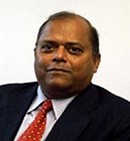
Plenary Lecture
Computational Modeling of Cardiovascular Flows Related to Heart Failure

Professor Ramesh K. Agarwal
Department of Mechanical Engineering and Materials Science
Washington University in St. Louis
USA
E-mail: rka@wustl.edu
Abstract: This paper addresses two important problems related to human heart failure due to disease in the cardiovascular system. These problems are analyzed using the Computational Fluid Dynamics (CFD) technology and the results are presented in a form that can be easily used in clinical practice for diagnosis and determination of appropriate intervention by a physician. The two problems considered are as follows: (1).The first problem deals with modeling of flow through stenosed aortic valve and arteries. It is well known that about 20% of cardiovascular surgeries performed in U.S. are not needed but there is no way to prevent it because of lack of accuracy in measurement techniques such as catheterization, echocardiography and MRI. The author has performed very careful CFD simulations to show that the widely used Gorlin equation for determining the stenosed valve area should be modified to give better prediction for low to high flow rates and mild to severe stenoses. Once accepted by the medical community, this work will have a major impact on diagnosing the stenosed arteries and valves. (2) Heart failure remains a leading cause of death worldwide. The human heart behaves like a mechanical pump that receives the low pressure blood from the venous system and ejects it at higher pressure into the arterial system. The left ventricle (LV) from where the oxygenated blood is pushed into the primary circulation plays a critical role in overall cardiac health. Therefore many studies have been conducted in-vivo and in-vitro to understand the effect of various parameters that influence the LV function. However, the understanding remains inadequate due to the complexity of LV diastole in its electrical, muscular and hemodynamic process. The author has developed an accurate quantitative prediction tool for determining the left ventricular flow patterns in patients with severe congestive heart failure (CHF) and left bundle branch block (LBBB) by synergistically combining the measurements from echocardiographic imaging with the computational modeling using the CFD software. One of the key objectives has been to correlate the blood flow pattern such as vortex formation in LV with existing measures of cardiac health such as ejection fraction. The collected echocardiographic and fluid dynamical analysis has been used to develop a simple but accurate global index that can be quickly used by a physician to distinguish diseased states by using information from non-invasive LV measurements.
Brief Biography of the Speaker: Professor Ramesh Agarwal is the William Palm Professor of Engineering and the director of Aerospace Engineering Program and Aerospace Research and Education Center at Washington University in St. Louis. From 1994 to 2001, he was the Sam Bloomfield Distinguished Professor and Executive Director of the National Institute for Aviation Research at Wichita State University in Kansas. From 1978 to 1994, he worked in various scientific and managerial positions at McDonnell Douglas Research Laboratories in St. Louis. He became the Program Director and McDonnell Douglas Fellow in 1990. Dr. Agarwal received Ph.D in Aeronautical Sciences from Stanford University in 1975, M.S. in Aeronautical Engineering from the University of Minnesota in 1969 and B.S. in Mechanical Engineering from Indian Institute of Technology, Kharagpur, India in 1968. Over a period of 35 years, Professor Agarwal has worked in Computational Fluid Dynamics (CFD), nanotechnology and renewable energy systems. He is the author and coauthor of over 300 publications and serves on the editorial board of fifteen journals. He has given many plenary, keynote and invited lectures at various national and international conferences worldwide. Professor Agarwal continues to serve on many professional, government, and industrial advisory committees. Dr. Agarwal is a Fellow of seventeen societies - American Association for Advancement of Science (AAAS), American Institute of Aeronautics and Astronautics (AIAA), American Physical Society (APS), American Society of Mechanical Engineers (ASME), American Society of Civil Engineers (ASCE), Royal Aeronautical Society (RAeS), Society of Manufacturing Engineers (SME), Society of Automotive Engineers (SAE), Institute of Electrical and Electronics Engineers (IEEE), American Society of Engineering Education (ASEE), American Academy of Mechanics (AAM), Institute of Physics, Energy Institute, Institute of Engineering and Technology, Academy of Science of St. Louis, Australian Institute of energetic Materials, and World Innovation Foundation (WIF). He has served as a distinguished lecturer of AIAA (1996-1999), ASME (1994-1997), IEEE (1994-2011), and ACM (2011). He has received many honors and awards for his research contributions including the ASME Fluids Engineering Award (2001), ASME Charles Russ Richards Memorial Award (2006), Royal Aeronautical Society Gold Award (2007), AIAA Aerodynamics Award (2008), AIAA/SAE William Littlewood Lecture Award (2009), James B. Eads Award of the Academy of Science of St. Louis (2009), SAE Clarence Kelly Johnson Award (2010), SAE Franklin W. Kolk Progress in Air Transportation Award (2010), ASME Edwin Church Medal (2011), AIAA Thermophysics Award (2011), SAE John Connors Environmental Award (2011), ASME Dedicated Service Award (2012), IET Heaviside Control Award (2012)